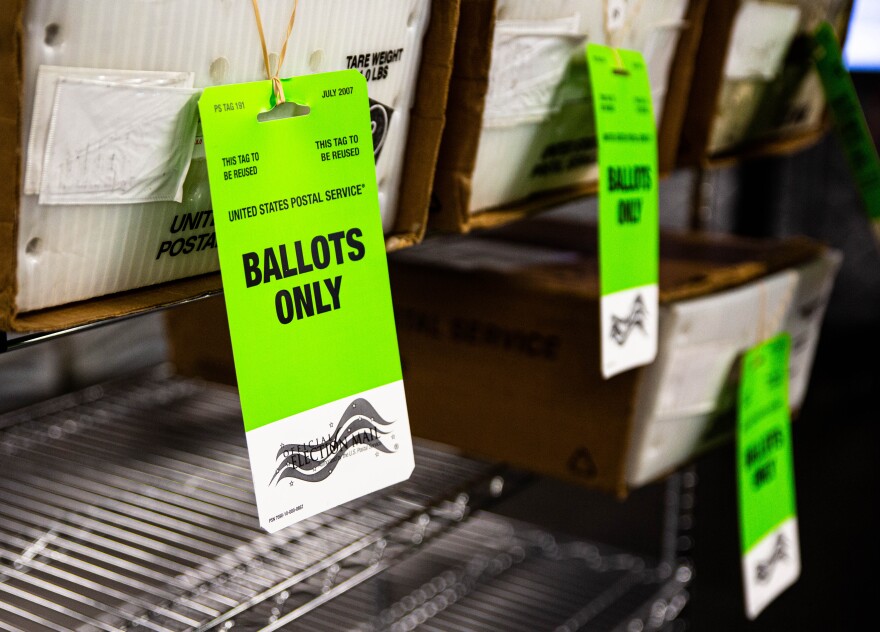A high-stakes trial over a new Florida elections law kicked off Monday, as the state and national Republicans square off against more than two dozen plaintiffs alleging that the measure discriminates against Black and Hispanic voters and will curtail third-party registration groups from helping Floridians gain access to the ballot box.
The Republican-dominated Legislature approved the sweeping election-law changes (SB 90) last year, as part of GOP leaders’ nationwide efforts to make it more difficult for people to vote by mail following former President Donald Trump’s 2020 re-election loss to Democrat Joe Biden.
The League of Women Voters of Florida, the Florida State Conference of the NAACP, Disability Rights Florida and two dozen other groups filed lawsuits challenging the measure. The plaintiffs maintain that the law is intended to make it harder for Black and Hispanic residents to vote, while Republicans contend the changes are necessary to ensure election integrity.
Chief U.S. District Judge Mark Walker is holding the trial remotely because of the COVID-19 pandemic, with lawyers and witnesses participating via video and members of the public listening over the phone. The challenges have been consolidated for trial.
Walker said Monday that the trial, originally scheduled for two weeks, will continue over the weekend. He also raised the possibility of adding another week to the proceedings involving dozens of witnesses and experts and a multitude of attorneys representing plaintiffs and defendants, including supervisors of elections and Secretary of State Laurel Lee.
The trial is focused on parts of the 2021 law that plaintiffs contend will make it more difficult for Floridians to vote by mail and harder for third-party organizations to conduct voter-registration drives and provide assistance during early voting and on Election Day.
The law requires third-party groups to provide disclaimers to people signing up to vote. The groups must submit voter-registration forms to supervisors of elections in the counties in which the residents live within 14 days after the applications are completed. The groups also have to notify applicants at the time the registrations are collected that the organizations might not
deliver the applications to the supervisors within the two-week time period and to advise people that they can register to vote in a different manner, such as by delivering the applications in person or by mail or by registering online.
Plaintiffs argue that the disclaimers will discourage people from registering to vote through third-party organizations, which frequently target Black and Hispanic prospective voters. According to research submitted by the plaintiffs, Black and Hispanic voters are five times more likely than white voters to register through third-party groups.
In testimony Monday, League of Women Voters of Florida President Cecile Scoon said the disclaimer “seems to have a negative impact” on prospective voters. Scoon described a situation in which a man had nearly completed the registration application before she showed him the disclaimer printed on a placard.
“He picked it up and looked at it. It froze him. He wasn’t happy. … He did an about-face,” Scoon said.
Scoon said many of her organization’s members stopped volunteering in voter-registration efforts rather than give the disclaimer, which she said undermines the “trustworthy” brand her group has established in many communities.
“It’s very harmful for us to have to give those kind of warnings,” she said. “People were very upset. They were concerned. They were embarrassed. … They were upset that they were being forced to say something that was not true.”
But Frank Zacherl, a Miami attorney who represents national Republican groups that have joined the lawsuit as defendants, questioned Scoon about the problem with informing people that voter-registration applications might not be turned in on time.
“There’s nothing wrong with giving people more information about the different ways they can register to vote. You would agree with that statement generally, correct?” asked Zacherl, who represents the National Republican Senatorial Committee and the National Republican Committee.
“The way it’s being done is very harmful,” Scoon responded.
Esteban Garces, director and co-founder of Poder Latinx, also testified Monday. His organization, which is a plaintiff, conducts voter-registration drives and civic-engagement efforts for Hispanic residents in Central and Southeast Florida, he said.
John Cycon, an attorney who represents Secretary of State Laurel Lee, asked Garces about 55 voter registration applications that Garces’ group failed to turn in on time before the election law passed.
Poder Latinx has since changed its processes to “make sure this doesn’t happen again,” Garces said.
“We’re talking about 55 voter registrations in the past, for our organization, out of 40,516. The disclaimer, while it might be true, it is misleading, and it forces us to cause our own reputational harm,” he said.
Another part of the 2021 law under scrutiny set a new restriction on the availability and use of drop boxes --- which were widely employed by elections supervisors amid the pandemic in 2020 --- where people can drop off vote-by-mail ballots.
Under the law, supervisors of elections must have the boxes staffed at all times and can only use the drop boxes during early voting hours and at early voting sites. Supervisors who violate the requirement face $25,000 fines.
Scoon, a Bay County attorney who is Black, said that having elections officials examining ballots when they are dropped off could deter voters from using the boxes.
Posting a person by a drop box “that people used to have free access to … is going to be very unwelcome and very reminiscent of … what my son experienced at 12,” she said, referring to an incident when her son was wrongly questioned by the police.
“People of authority often have a different attitude toward people of color,” Scoon said. “These are multiple experiences that people of color are well aware of that many of my white friends have no idea about. They just don’t. … I believe it’s going to stop people from using the drop box … They’re not gonna want to have another experience where they feel like they’re the other.”



